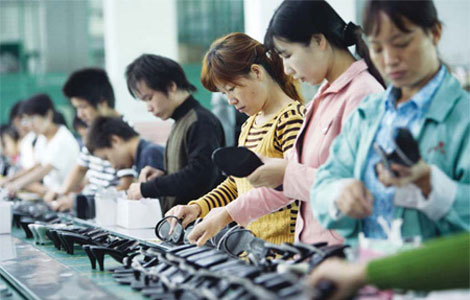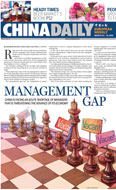EU to end duties on Chinese shoes
Updated: 2011-03-25 10:42
By Bao Chang (China Daily European Weekly)
 |
|
Workers at a production line for women's shoes at the Junsheng Shoe factory in Dongguan, Guangdong province. Chinese shoe makers will resume exports to the European market when the tarriffs are removed. Qilai Shen / Bloomberg |
Decision made after European footwear industry association withdraws petition
The European Union (EU) plans to terminate its four-year-long anti-dumping duties on leather shoes imported from China as of April 1. The move will present an opportunity for Chinese shoe manufacturers to expand business in the European markets.
The decision was made after the European Confederation of Footwear Industries, Europe's largest shoemakers association, withdrew its petition for an extension of tariffs.
The European Commission, which oversees trade policy for the 27-nation bloc, will monitor imports of Chinese-made footwear with leather uppers in a bid to protect producers within the EU, most of whom are small or medium-sized, according to a statement on the Ministry of Commerce website on March 22.
"Chinese shoe manufacturers will resume their exports to the European market when the unreasonable tariffs are removed," says Mei Xinyu, a researcher on international trade affiliated with the Ministry of Commerce.
Mei says European manufacturers should develop their business to improve their competitiveness instead of pinning their hopes on "trade protectionism".
The EU began to levy anti-dumping duties ranging from 9.7 percent to 16.5 percent on Chinese shoes with leather uppers in 2006 and extended the tariff by a further 15 months in 2009.
China lodged a complaint against the EU decision with the World Trade Organization last year.
At present, total shoe export volumes account for 25 percent of the total Chinese output annually and most leather shoes are priced at around $10 (7.1 euros) overseas.
"China's shoe manufacturers saw their business decline after the EU imposed anti-dumping duties in 2006," Mei says.
According to a report in the Southern Metropolis Daily, about 20,000 people in the shoemaking industry lost their jobs because of the levy during the 2006-2008 period.
Zhejiang Aokang Shoes Co, one of China's largest shoe manufacturers, registered annual growth of about 20 percent in its exports to the European market before the imposition of the levy. Exports dropped by about 10 percent after the imposition, according to the report.
Aokang shoes are mostly priced around $20 when sold overseas.
"Chinese shoe producers should expand their business to more overseas markets, establish research and development centers and purchase chains abroad or even merge with other international brands to improve their global competitiveness," says Wang Zhentao, chairman of Aokang, quoted by Xinhua News Agency.
The China Leather Industry Association said that it would be more effective for Chinese shoemakers to strengthen communication and cooperate with EU companies and learn more about industry regulations in foreign countries to win in the overseas markets.
E-paper

Rise and shine
The Chinese solar energy industry is heating up following recent setbacks in the nuclear sector
Bombs aim for regime change
CSI, with a twist
Literary path
Specials

Peony express
Growers of china's unofficial national flower are reaching out to europe for help

Tea-ing up
More turning to Chinese tea for investment opportunities like vintage wine

A cut above
The ancient city of Luoyang is home to a treasure trove of cultural wonders.
